
South Ossetia, officially the Republic of South Ossetia–State of Alania, is a partially recognised landlocked country in the South Caucasus. It has an officially stated population of just over 56,500 people (2022), who live in an area of 3,900 square kilometres (1,500 sq mi), with 33,000 living in the capital city, Tskhinvali.
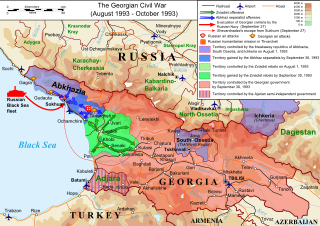
The Georgian Civil War lasted from 1991 to 1993 in the South Caucasian country of Georgia. It consisted of inter-ethnic and international conflicts in the regions of South Ossetia and Abkhazia, as well as the violent military coup d'état against the first democratically-elected President of Georgia, Zviad Gamsakhurdia, and his subsequent uprising in an attempt to regain power.
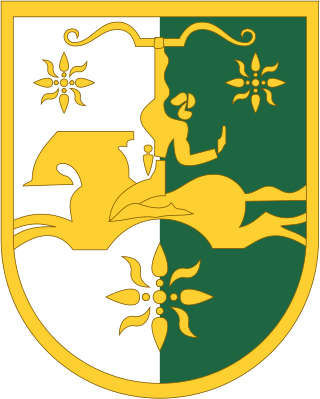
Politics in Abkhazia is dominated by its conflict with Georgia. Abkhazia became de facto independent from Georgia after the 1992–1993 war, but its de jure independence has only been recognised by a few other countries. Abkhazia is a presidential representative democratic republic with a multi-party system, wherein the President is both head of state and head of government. Executive power is exercised by the government of the Republic of Abkhazia. Legislative power is vested in both the government and the People's Assembly of Abkhazia.

The Abkhazia conflict is a territorial dispute over Abkhazia, a region on the eastern coast of the Black Sea in the South Caucasus, at the intersection of Eastern Europe and Western Asia. The conflict involves Georgia, the Russian Federation and the Russian-backed self-proclaimed Republic of Abkhazia, which is internationally recognised only by Russia, Venezuela, Nicaragua, Nauru, and Syria; Georgia and all other United Nations members consider Abkhazia a sovereign territory of Georgia. However, as of 2023, Georgia lacks de facto control over the territory.

The Georgian–Ossetian conflict is an ethno-political conflict over Georgia's former autonomous region of South Ossetia, which evolved in 1989 and developed into a war. Despite a declared ceasefire and numerous peace efforts, the conflict remained unresolved. In August 2008, military tensions and clashes between Georgia and South Ossetian separatists erupted into the Russo-Georgian War. Since then, South Ossetia has been under a de-facto Russian control.
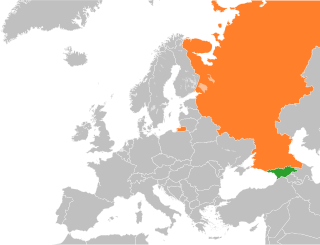
Contacts between Russia and Georgia date back to the 15th and 16th centuries, and the most important stage started in the 1580s, when the Georgian kingdom of Kakheti and the Russian Empire signed a treaty of alliance in 1587. Relations between the two countries developed vibrantly and culminated in the Treaty of Georgievsk, which established eastern Georgia as a protectorate of Russia. At that time, Georgia saw Russia as a powerful Christian and modernizing neighbor, capable of protecting Georgia from invading Muslim empires and North Caucasian raiders.

The prelude to the Russo-Georgian War is the series of events, including diplomatic tensions, clashes, and skirmishes, that directly preceded the August 2008 war between Georgia and the Russian Federation. Though tensions had existed between the two countries for years and more intensively since the Rose Revolution, the diplomatic crisis increased significantly in the spring of 2008, namely after Western powers recognized the independence of Kosovo in February and following Georgian attempts to gain a NATO Membership Action Plan at the 2008 Bucharest Summit; and while the eventual war saw a full-scale invasion of Georgia by Russia, the clashes that led up to it were concentrated in the breakaway republics of Abkhazia and South Ossetia, two separatist Georgian regions that received considerable Russian support over the years.

The 2008 Georgian drone shootdowns refer to a series of military incidents involving Georgian unmanned aerial vehicles brought down over the breakaway republic of Abkhazia between March and May 2008. The skirmishes were part of a larger context of tensions between Georgia and Russia, eventually leading up to the Russo-Georgian War.

The August 2008 Russo-Georgian War, also known as the Russian invasion of Georgia, was a war waged against Georgia by the Russian Federation and the Russian-backed separatist regions of South Ossetia and Abkhazia. The fighting took place in the strategically important South Caucasus region. It is regarded as the first European war of the 21st century.

This article describes the background of the Russo-Georgian War.

Abkhazia, officially the Republic of Abkhazia, is a partially recognised state in the South Caucasus, on the eastern coast of the Black Sea, at the intersection of Eastern Europe and Western Asia. It covers 8,665 square kilometres (3,346 sq mi) and has a population of around 245,000. Its capital and largest city is Sukhumi.
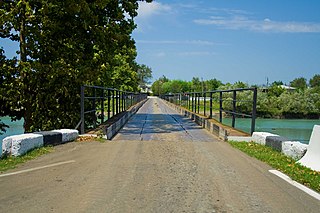
Ganarjiis Mukhuri is a village in the Samegrelo-Zemo Svaneti region of western Georgia, in the Zugdidi municipality. It is situated at the border with Abkhazia and the city of Zugdidi. The village area is located by the Black Sea and on the right bank of the Enguri River, with the village center six kilometers from the sea. Within the administrative division of the municipality, Ganmukhuri is not part of a community, but is an so called independent village.

Gali District is one of the districts of Abkhazia, Georgia. Its capital is Gali, the town by the same name. The district is smaller than the eponymous one in the de jure subdivision of Georgia, as some of its former territory is now part of Tkvarcheli District, formed by de facto Abkhaz authorities in 1995.
The Georgian sea blockade of Abkhazia has been in force since 2004, when it was ordered to be imposed by Georgian president Mikheil Saakashvili. As a response to the 2008 South Ossetia war, Georgia moved to intensify Abkhazia and South Ossetia's isolation, declaring both entities as Russian-occupied territories outlawing economic activity in the regions without Tbilisi's permission. Several cargo ships in Georgian waters have been detained by the Georgian coast guard in 2009 on the grounds of violating of Georgia's law on occupied territories, which bans economic activities in breakaway Abkhazia and South Ossetia without Georgia's consent.
Events in the year 2012 in Georgia.

Russian-occupied territories in Georgia are areas of Georgia that have been occupied by Russia since the Russo-Georgian War in 2008. They consist of the regions of the Autonomous Republic of Abkhazia and the former South Ossetian Autonomous Region of Soviet Georgia, whose status is a matter of international dispute.
The following lists events in 2017 in Georgia.
The following lists events in 2018 in Georgia.
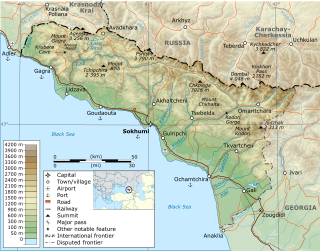
The Abkhazia–Georgia separation line is a de facto boundary set up in aftermath of the War in Abkhazia and Russo-Georgian War, which separates the self-declared Republic of Abkhazia from the territory controlled by the Government of Georgia. Republic of Abkhazia, and those states that recognise its independence, view the line as an international border separating two sovereign states, whereas the Georgian government and most other countries refer to it as an 'Administrative Border Line' within Georgian territory. The Georgian government views Abkhazia as a Russian-occupied Georgian territory and designates the de facto boundary as an occupation line in accordance with the Georgian "Law on Occupied Territories of Georgia". The Constitution of Georgia recognizes Abkhazia as autonomous within Georgia, therefore the line corresponds to the 'Administrative Border' of the Autonomous Republic of Abkhazia within Georgian territory.















